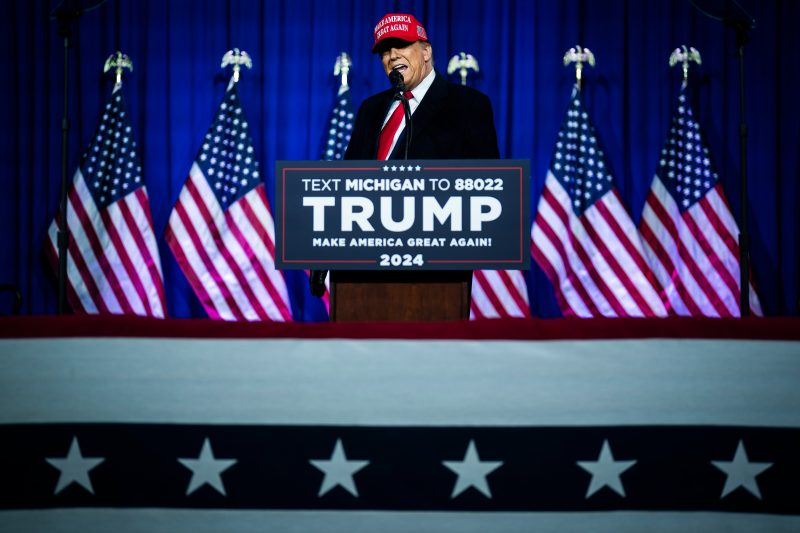Former president Donald Trump, who earlier this month set off worries among allies after he said would encourage Russia to invade a NATO country that wasn’t spending enough on defense, has remained largely silent on the death of Alexei Navalny, only appearing to suggest baselessly that he is being persecuted in the way Russian President Vladimir Putin’s most potent political opponent was.
The front-runner of the GOP presidential primary has made multiple public appearances since Russia announced Navalny’s death in a faraway Arctic penal colony on Friday. But he has not publicly condemned the dissident’s shocking death, even though he frequently speaks about what he would do as president when confronting Russia, Putin and the war in Ukraine.
Navalny embodied the resistance to Putin’s regime more than any other Russian opposition figure, and his death at 47 in the prison camp was seen as a watershed signal that no dissent will be tolerated in Russia as Putin shifts toward a highly centralized, deeply repressive totalitarian regime.
Unlike many other U.S. and international leaders, Trump has not criticized Putin’s jailing of Navalny or mourned his untimely death.
Instead, the former president only offered an analogy comparing himself to Navalny on a post shared Sunday afternoon on Truth Social, his social media site: “Biden:Trump::Putin:Navalny.”
Trump, who is under multiple criminal investigations, has long claimed without evidence that the U.S. justice system has been weaponized against him.
Unlike Trump, Navalny was jailed repeatedly for long periods and was sentenced to a 19-year term in August on charges of “extremism” centered on his political opposition to Putin’s leadership.
Russia’s justice system is widely viewed as beholden to the executive authority of the president, while, in the United States, there are multiple protections in place to afford the Justice Department independence in seeking criminal charges.
Days before Navalny’s death — the cause of which the Russian government has not yet explained — Trump, who has often praised Putin, told a crowd of supporters in South Carolina that he would encourage Russia to do “whatever the hell they want” to any NATO member country that he believes is not paying their share due to the alliance.
The remarks sparked controversy in the United States and Europe, with American leaders promising that they would remain committed to NATO allies and European leaders expressing concern that a second Trump presidency could erode the alliance.
As The Washington Post reported Friday, during his four years in office, Trump appears to have never once mentioned Navalny’s name.
After the Russian dissident was poisoned with a banned nerve agent in August 2020, Trump as president was asked how he might respond. He talked about how tough he had purportedly been on Russia and noted that there was no proof of Russia’s involvement on Navalny’s poisoning.
Navalny, the U.S. State Department and European authorities have blamed Russian security forces for the poisoning. Trump never condemned the poisoning, even after Navalny called on him to do so.
And now, Trump’s silence on condemnation of Navalny’s death stands in stark contrast to harsh criticism from other U.S. political figures.
President Biden, speaking from the Roosevelt Room of the White House on Friday, said Putin is responsible for Navalny’s death.
“What has happened to Navalny is yet more proof of Putin’s brutality. Nobody should be fooled,” Biden said.
In a statement Saturday, former U.N. ambassador Nikki Haley, Trump’s remaining challenger in the GOP presidential primary, emphasized that Trump had not mentioned either Navalny or Putin, and she questioned whether the former president believes Putin is responsible for Navalny’s death.
Speaking to ABC News on Sunday morning, Haley called Navalny a hero and said it is important to “stand with the Russian people who believe Navalny was really talking for them.” Navalny, she said, “was fighting corruption. He was fighting what Putin does.”
“And what did Putin do? He killed him, just like he does all his political opponents,” Haley said.
“We need to remind the American people that Vladimir Putin is not our friend,” Haley added. “So when you hear Donald Trump say in South Carolina a week ago that he would encourage Putin to invade our allies if they weren’t pulling their weight — that’s bone chilling, because all he did in that one moment was empower Putin.”
A spokesman for Trump did not immediately respond to a request for comment.
The former president’s campaign has previously pointed to a post that Trump made on his social media site, Truth Social, as his official response to Navalny’s death. The post makes no mention of Putin, Navalny or the Ukraine-Russia war; it instead baselessly blames Biden for a rise in “Misery, Destruction and Death” in the world.
The comment is also buried among more than 20 posts Trump made on other issues, including the U.S. border, Haley, the multiple criminal investigations he faces and election poll numbers.
Trump’s lack of criticism should be a warning about the type of presidency Trump would run if reelected, said former congresswoman Liz Cheney.
“When you think about Donald Trump, for example, pledging retribution, what Vladimir Putin did to Navalny is what retribution looks like in a country where the leader is not subject to the rule of law,” Cheney said Sunday on CNN’s “State of the Union.” “And I think that we have to take Donald Trump very seriously. We have to take seriously the extent to which you have now got a Putin wing of the Republican Party.”
Philip Bump and Isaac Arnsdorf contributed to this report.

